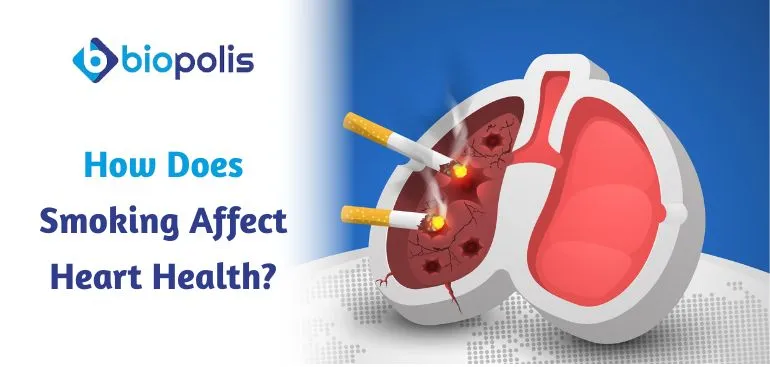Subtotal ₹0.00
One of the biggest causes of heart problems today is smoking. People believe that smoking has a bad impact on lung health, but that’s not the case. Smoking affects heart health as well. When you smoke, harmful chemicals enter your body and cause damage to your heart and blood vessels. This leads to strokes, heart attacks, and other heart-related problems. People who smoke are at a higher risk of developing heart-related problems when compared with people who don’t. Smoking increases the blood pressure, lowers oxygen in the blood, and makes your heart work harder than it should.
Smoking also affects cholesterol levels. It lowers good cholesterol and increases bad cholesterol, which can block blood flow. Quitting smoking can improve heart health.
1. Reduces Oxygen Supply To The Heart
Smoking reduces the oxygen supply to the heart, and this makes it harder for the heart to function properly. Cigarette smoke contains carbon monoxide, and it replaces the oxygen in the red blood cells. This means that now the heart has to work harder to pump enough blood to the whole body. Less oxygen reaching the heart increases the chances of heart attacks, chest pains, etc. People who smoke often feel tired and breathless because their heart is not getting enough oxygen. When you quit smoking, the amount of carbon monoxide decreases and your heart functions very well.
2. Smoking Increases Blood Pressure
One of the harmful effects of smoking is that it raises blood pressure. Each time you smoke, the nicotine levels in your blood vessels get narrower. This forces your heart to pump blood and increases blood pressure. Over time this consistent pressure can cause damage to the arteries and lead to serious health issues. Nowadays, high blood pressure is one of the main reasons for heart attacks and strokes. People who smoke regularly face long-term blood pressure, even when they are not smoking. Quitting smoking can bring your blood pressure back to normal after a while.
3. Increases Risks Of Blood Clots
Smoking increases the risk of blood clots. The chemicals that are present in cigarettes cause the blood to thicken and cause clots. They block the flow of blood to the brain or the heart, and this leads to heart attacks. This is why smokers suffer from heart problems at a young age. In addition to that, blood clots can cause damage to other parts, such as legs, arms, etc. When you quit smoking, it helps to thin the blood and reduce clot formation. Moreover, it also improves circulation and reduces the chances of life-threatening heart issues.
4. Damages Good Cholesterol Levels
Smoking has a negative impact on cholesterol levels. It lowers the amount of good cholesterol and increases bad cholesterol. Good cholesterol helps in removing extra fat deposits. When good cholesterol is low inside your body, then it leads to fat buildup. This makes the arteries hard and narrow and increases the risk of heart diseases. Smokers suffer from the problem of high cholesterol levels and other cardiovascular diseases. When you stop smoking, it helps restore healthy cholesterol levels.




Comments are closed